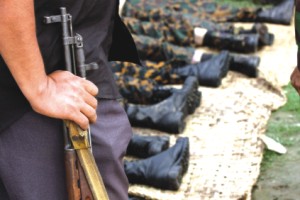|
Reflections
The Aftermath of the Massacre
Ahmede Hussain
On the last three days of February a bunch of degenerate members of the Bangladesh Rifles (BDR), armed with the money and ammos of their patrons, turned Pilkhana, the headquarters of the BDR, into a killing field. Some of the brilliant patriotic officers of our armed forces and their family members were killed in the most barbaric manner. For 72 long hours, the country and the nation's security remained hostage at the mercy of these debased jawans.
Such dastardly display of murder and cowardice cannot be called rebellion. Some of the alleged masterminds of the carnage have been grilled by the interrogators and newspaper reports suggest that the perpetrators of one of the grisliest massacres of our nation's history did not act alone. It is expected of the government to run the investigation with outmost care, and more importantly in a neutral manner. Previous investigations of such carnages have not been done in a transparent manner by the former governments and one hopes that the Pilkhana massacre will be an exception. The investigators need to dig deep into the conspiracy and not a single one of the murderers and their patrons must escape justice. 
The butchery done by the killers has given an irreparable blow to the army; besides the death of the officers, with whom it was possible to man nine regiments in the least, the incident has also exposed intelligence failure. It is a shame that the planning of such magnitude has gone unnoticed by our policymakers. The incident has also shown how vulnerable our national security is, especially at a time when the South Asian sub-continent has become prone to terrorism of different colours and hues.
The ease with which the murderers and their accomplices fled with no obstruction whatsoever points to extreme inefficiency on the part of those who should have secured the points of possible escape.
Then there is the question of reconstruction of the BDR, some of whose non-commissioned members have shamelessly flouted the basic tenants of discipline. Whether these jawans are capable of serving the reconstructed BDR is a big question, the answer to which our policymakers have to find sooner than later. There are, however, some jawans who during the carnage tried to save lives. The border guards need to be reconstructed as early as possible.
The incident has also highlighted the need for a national defence policy. Every democratic nation has it; it is not understandable why we should not have one. The government, after consulting various stakeholders, can form a national defence policy.
Traumatised though the members of our armed forces are, they have remained a disciplined force and are continuing to act in the highest traditions of professionalism. The restraint with which they have handled the crisis have earned them the love and respect of the ordinary Bangladeshis. Members of Bangladesh's armed forces in their service to the UN have embraced martyrdom; their contribution to peace and rebuilding the lives of the millions in strife-torn Africa and East Europe have made Bangladesh proud. At home they have given us “the most flawless voter list in the world”, as a European Union member has put it.
Those who killed some of the bravest sons and daughters of our nation on the dark days of February are enemies of our democracy. They must be tried and handed down exemplary punishment so that such a cowardly and barbaric act does not repeat itself.
.Copyright
(R) thedailystar.net 2009 |
